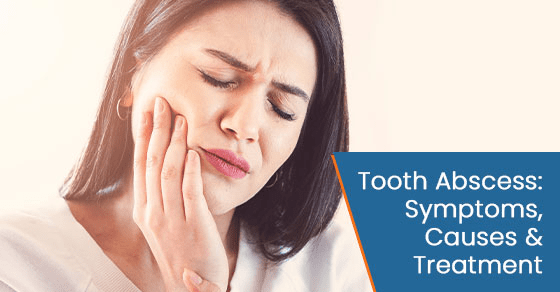Are you experiencing a persistent, throbbing toothache with sharp, shooting pains? Does one tooth hurt to touch? Is the tooth sensitive to hot and cold temperatures? If so, you may have a tooth abscess.
A tooth abscess is a pocket of pus resulting from a bacterial infection around a tooth or the gums. It looks like a red and inflamed boil or pimple. Abscesses cause severe pain and discomfort, affecting your neck, jaw, ear, and mouth. Without treatment, these infections worsen and spread to other body parts. Consequently, you must seek professional treatment as soon as possible.
In this article, we overview the symptoms and causes of dental abscesses. That way, you will identify a potential abscess and get the help. We also cover the most common treatment options for tooth abscesses.
Bloor West Smiles offers emergency dental care to new and existing patients. For a same-day appointment with one of our emergency dentists, call us at 416-766-2853.
What are the symptoms of a tooth abscess?
Abscesses are from an infection in the tooth or gum- and this infection is often painful. Consequently, significant pain and discomfort are the most common and apparent tooth abscess symptoms. Whenever you’re experiencing a mild to severe toothache, you should seek professional help immediately. It’s a sign that something is very wrong.
In addition to a severe, uncomfortable toothache, you might also experience these symptoms:
- Throbbing pain radiating to your jawbone, neck, or ear.
- Tooth sensitivity, pain, or discomfort with hot and cold temperatures.
- Swelling and sensitivity around a tooth or gums.
- Persistent bad breath or a foul taste in your mouth.
- Sensitivity to pressure from chewing.
- Tender and swollen lymph nodes under your jaw or in your neck.
- Difficulty opening your mouth, swallowing, or breathing.
- Fever.
If your symptoms are severe or you have a fever, facial swelling or trouble breathing, you need urgent medical attention. Go to the emergency room or contact your emergency dentist.
If you feel a rush of foul-smelling and foul-tasting salty fluid in your mouth, followed by pain relief, that likely means the abscess has ruptured. Even in this case, you still need urgent dental treatment. The abscess may not drain properly, and the infection can still spread to other parts of your head and neck.
What causes an abscessed tooth?
Bacterial dental infections cause tooth abscesses that are usually a result of poor dental hygiene or a dental injury (like a damaged tooth). Damage and decay can create a hole in your tooth’s protective enamel. In extreme cases, this hole reaches the tooth’s innermost pulp, where the nerves, blood vessels, and tissues are.
Bacteria enter the tooth through this hole or weakened enamel, attack the pulp, and cause a bacterial infection. The resulting abscess is called a periapical abscess. Occasionally, prior dental work can also leave an opening for bacteria.
Teeth that are cracked, fractured, broken, or otherwise damaged can become infected. These injuries are almost always accidental and challenging to prevent (except for wearing a mouthguard during sports).
Cavities and tooth decay are preventable. Smoking, poor diet, dry mouth, and high sugar consumption all decay teeth and leave them vulnerable to infections.
Gingivitis and gum disease can also cause abscesses (called gingival or periodontal abscesses). In these instances, the bacteria accumulate in periodontal pockets or abrasions on the gum’s surface.
How is a tooth abscess treated?
Tooth abscesses do not go away, and never treat one at home. You require specialized treatment from a dentist or specialist. If you’re struggling with a tooth abscess, see an emergency dentist as soon as possible. The dentist will drain the abscess safely and remove the infection effectively.
A dentist treats a tooth abscess in several ways, depending on the severity of the infection.
Incision and Drainage
The dentist drains the abscess. They make a small incision in the abscess, allowing the pus to drain. After washing with saline (salt water), a small rubber drain may be placed over the area. It keeps the incision open so it can drain fully.
Root Canal
Most tooth abscesses receive a root canal. Root canals remove infection within the tooth’s pulp without requiring an extraction. During a root canal procedure, the dentist drills into the infected tooth, removes the infected pulp and cleans the tooth. Then, they fill and seal the tooth with a crown or cap to prevent further infection.
The tooth can survive without the pulp, so you regain the full function of your tooth. It will look and work like normal. Teeth receiving a root canal can last for a lifetime if cared for properly.
Tooth Extraction
Tooth extractions are always a last resort. The priority is to remove the infection while preserving the natural tooth. Sometimes, for severe infection, the tooth is too damaged to be saved. In these cases, the dentist has to remove the tooth.
Your dentist may prescribe antibiotics in addition to your other treatment. Although antibiotics will not stop the infection, they prevent infection from spreading further. They also help your body fight off the remaining bacteria.
The dentist will assess the extent of the infection to determine if antibiotics are necessary. If you have a weakened immune system. However, you will likely receive antibiotics.
Need an Emergency Dentist? Contact Bloor West Smiles
The emergency dentists at Bloor West Smiles are here to help. If you are experiencing any kind of dental emergency, contact us immediately. Let us know when you will arrive so we can plan for your requirements. Don’t wait. Call your emergency dentist right away at 416-766-2853.
For an emergency dentist in Toronto, call Bloor West Smiles at 416-766-2853 or contact us here.


Sorry, comments are closed for this post.